Text
Hey everyone, my friend shared this GoFundMe to help a young woman(a friend of hers) escape her abusive father along with her sister and mother. Please boost, share and donate!
CW: Heavy abuse, physical and psychological. Sexual harassment
Please do not tag as d*nation post!!!!
#boost#trigger warning#pakistani woman#sexual abuse#domestic violence#help is urgently needed#feminism#pass this around - family and friends#pass this around among your family and friends
249 notes
·
View notes
Photo
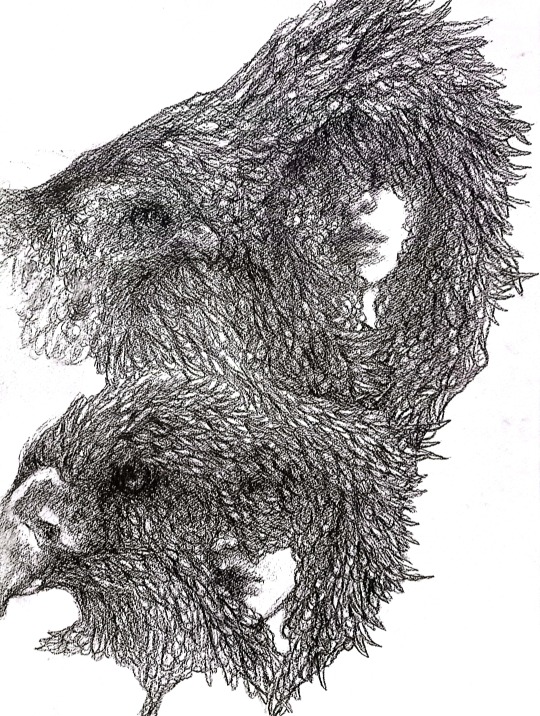
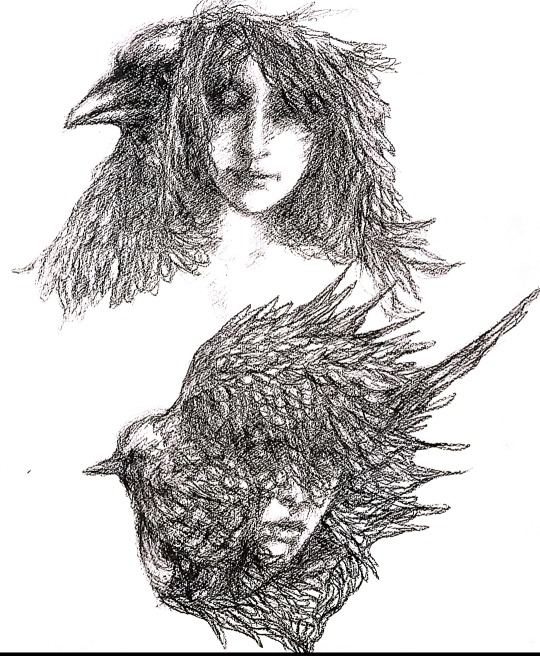
From top to bottom, children cut-outs in birds:
Uchiha Madara, Twelve, The Falcon.
Uchiha Sasuke, Twelve, The Hawk.
Uchiha Itachi, Fourteen, The Crow.
Uchiha Obito, Fourteen, The Sparrow.
(I had a hard time choosing a bird for Obito; however, in the end, I went for a sparrow. The reason I chose a sparrow for Obito is that he wasn’t as staunch in his convictions as Sasuke and Madara were: he was rather foolhardy, kind of like someone who chooses to take flight rather than fight. That makes Sasuke and Madara born fighters, birds of prey, not Obito. Itachi, on the other hand, was always a sort of scavenger, an opportunist; and whilst he’s nowhere near as clever as the idea of a crow goes, the opportunist theme for him fits.)
101 notes
·
View notes
Photo

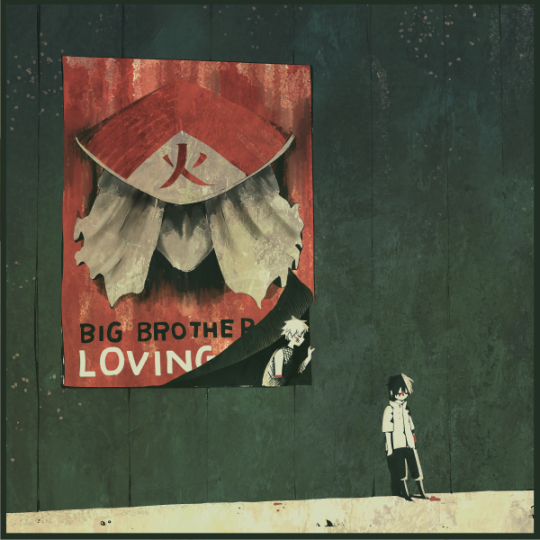

Brother
2K notes
·
View notes
Photo
The Konoha badge still serves as a distancing factor. I wonder if this is on purpose or just an interpretation from my viewpoint.
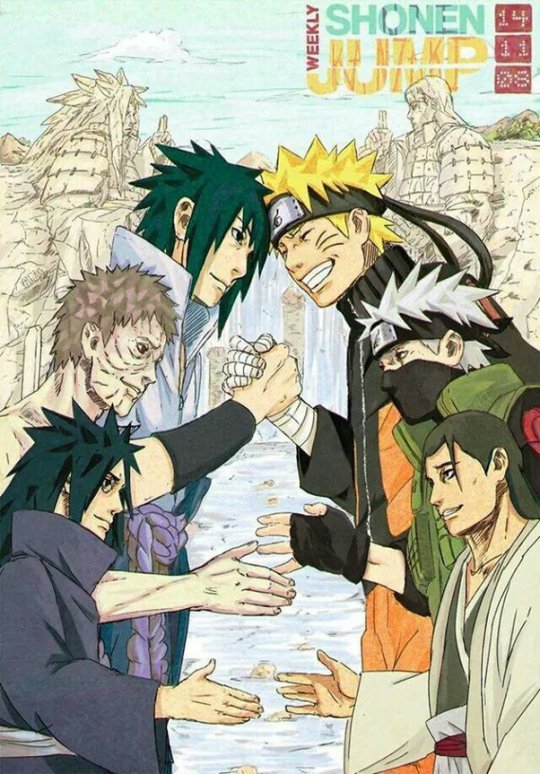
Yet another image that proves that, when Kishimoto shows distance between two people being eliminated, he always goes for the forehead bump, not the forehead poke! Here, just like that Itachi farewell, Sasuke and Naruto bump their foreheads together whilst the rest of the chosen champions don’t, as there’s still distance, animosity, or reservations between them. So can we stop saying that the forehead bump is meaningless, when it’s literally shown as the sign of lack of distance, and the forehead poke, which is shown to keep the distance between two people, is more meaningful? It’s not. And at this point, it shouldn’t even be a thing!
118 notes
·
View notes
Text
to be a naruto villain is to transcend your fate. the protagonist is supposed to fix you but the writer doesnt know what to do with you. the fandom eats up the sanitized versions of you, while reviling the you that had agency and whose voice said something true and beautiful. you are free. you are trapped by the narrative. the real you died with talk no jutsu, killed by an act of god. you are functionally frozen in time, and thus immortal
316 notes
·
View notes
Note
How do you interpret hashirama offering to kill himself rather than his brother ? Do you think it was genuine or more cunning and manipulative, betting on madaras intervention ?
Hashirama's self-sacrifice, an act of faith or cunning?
{A thank you goes to @narrative-critical-understanding for their input on this theme!}
It’s an interesting ask Anon and do forgive me for answering with a jet-lag of over a… year (yikes!)
Personally, I feel that if ever there was a collection of panels in which Hashirama was intended by Kishi to be shown as authentic to the bone in his intentions, it’s this one here in which he asseverates with fervent pathos and conviction to exchange his own life for the sake of harmony between the two warring clans, as it was, after all, his ultimate ambition to create a world devoid of conflict and sacrifice.
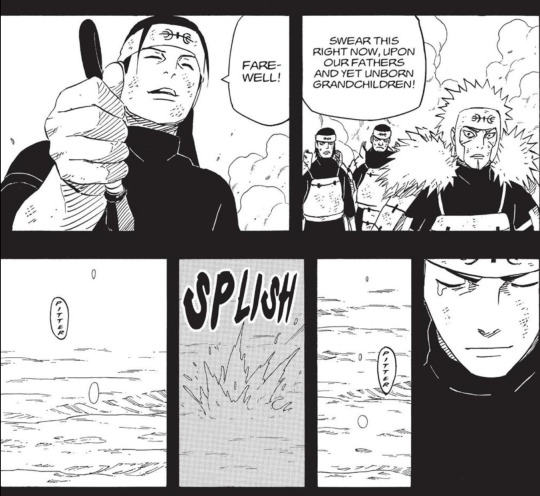
I've always enjoyed probing the artist's (or mangaka's, if your wish) representations of their characters. Kishimoto is an exquisite story-teller and I have to point out how he's an absolute maestro when it comes to drawing facial expressions — he has this wonderful capability of bringing to life his little fictional guys, bequeathing unto them this exquisite depth that allow them to express an infinite range of emotions. To me, Hashirama here is pervaded by solemnity of conviction. I don't see manipulation in his tears, in his visage at the top left corner which is so theatrical - at least, not towards Madara.
If laying down his life was the price to pay for peace, Hashirama was willing to with-go that forfeiture.
And I think this compounding resolution of his slots in perfectly with the ethos of Bushidō, (Japanese for "Way of the Warrior”) that permeated the Kamakura period and gave rise to the bloody practice of Seppuku (ritual disembowlment) — The dominating principles of this comprehensive ideology were comprised of an unwavering dedication to martial spirit, so athletic and military skills, perseverance and courageousness when confronting a fearful adversary in conflict, filial piety, frugality in day to day life… And kindness, honesty, devotion to personal honour.
Under Bushidō, seppuku was a paramount means to substantiate the courage, self-control, and undying resolve of the warrior… And above all, to attest sincerity of purpose.
To execute the act, the samurai or warrior would plunge a tantō or wakizashi into the left side of their abdomen, to then draw the blade laterally across to the right, and finally turn it in an upward stroke. In some cases, they’d stab below the sternum, press downward across the initial cut and to complete the practice, they’d pierce their throat.
Needless to say, it was an extreme and exceptionally painful ritual — it certainly wasn’t a frivolous act to be sneered at, as it required an unyielding resolve to go through with it: for a warrior, it was the epitome of self-sacrifice towards an ideal, a purpose, to atone for something heinous or for an unforgivable failure. It was also an undying proof of loyalty.
Hashirama, as a warlord, as a commander, as a warrior, or as whatever you wish to see him as, was endowed with great intestinal fortitude and sense of perseverance — after all, one of his most referenced quotes is “shinobi are people who endure to achieve their goals…”, etcetera etcetera, you know the rest of it...
I can definitely see him as one to go through with a final perfervid act of sheer devotion for a cause, even if it implies inflicting horrific pain upon himself — in a sense, dedication to such a ritual amplifies the profound sentiments behind it: so it becomes an even greater sacrifice.
All things considered, yes, I think it’s intended for him to be entirely transparent in his bearing and to, figuratively, “show his guts” to Madara: he was prepared to relinquish his life for his visionary dream to become a tangible reality. Otherwise, the promise of a new world would have little value to it, if any at all.
Wouldn't it have been a massive breach of the warrior's code of honour for him to bank on Madara's "kindness"?
Had Madara not acted in the nick of time, what would Hashirama have done, at that point, had he not been genuine in his words?
“Ohi sorry mate, I really gotta heal myself now, I thought you were gonna grab my wrist to stop me from killing myself, or something along those lines…. whoopsie…“ ?
Madara wasn’t even one to be swayed by a talk-no-jutsu, he was diffident and constantly sought out truthfulness in those around him — I’m not sure he could be manipulated to that extent, at least not in this specific scenario (prior to black Zetsu infecting his mind).
However, this isn’t to say Hashirama’s actions weren’t without negative consequence: his tenacious firmness of purpose is such that he becomes reckless in his decisions.
For one, even though he forbade his brethren to kill Madara and reignite the feud with the Uchiha, he storms forth in his brash resolution: if you think about it, none of the Senju nor Tobirama ever gave their word. And yet, Hashirama expected absolute loyalty from them without ever considering their perspective.
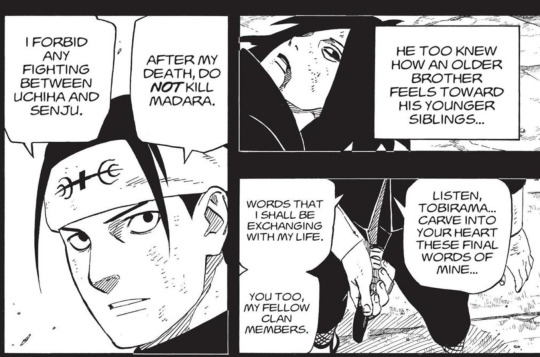
In the panels below, Tobirama is utterly gobsmacked, and what’s more is he wanted nothing more than to have Madara executed there and then, regardless of whatever his brother had to say, as to him Madara was just some raving lunatic. The only deterrent was Hashirama himself, whom he feared (I'll die on this hill: they were not on par and Tobirama did fear his judgment and probably his mental faculties as well).
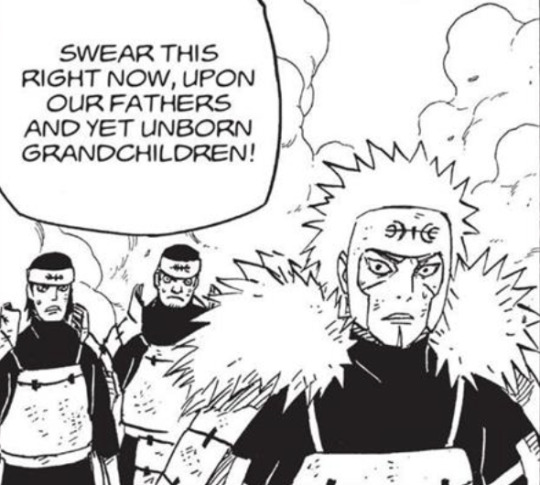
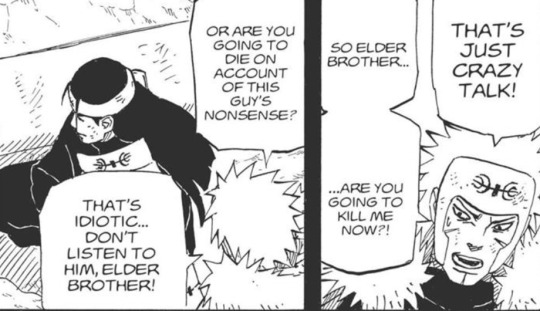
It’s disconcerting how Hashirama placed such a degree of trust in him to honour his desires, and out of his own free will at that! Perhaps this is a moment in which Hashirama’s naïveté seeps through, or maybe his ardent desires for this dream of peace of his to come to fruition blind him to the reality of things: because how could he possibly expect Tobirama to concede to this? Even consider it?
It’s just so entirely unrealistic: unless, of course, it’s forced upon him. And I think that's precisely what Hashirama is pinning his faith upon: coercing his brother into acceptance.
In this sense, you could say he was (subconsciously) manipulative to a degree: through honourable suicide, Tobirama would be inveigled, out of sheer respect of his elder brother’s wishes, to uphold this imposed promise (which he never actually committed to in the first place), however begrudgingly. If anything, I can speculate Hashirama was placing far too much confidence in his younger brother to conform and internalise that very same dream, to make it his own even, a dream he once divined, fathomed and entrusted to Madara - not him, his own kith and kin, but to their bitter nemesis, an Uchiha.
That’s one hell of a gamble (not exactly ironic, since Hashirama was blighted with that very vice which made him known as a gambling man prone to squandering his riches). In these panels, he doesn't exactly show his cunning, but he certainly displays his vehemence and willing blindness and ignorance (in the archaic sense of the term, so to ignore voluntary) in acknowledging his own clan's dismay when there's something so much greater at stake in his eyes: his own ideals.
And here's a good question, relative to yours: how do you rate the sincerity of someone who bends others' wills do his, through sheer unadulterated power?
80 notes
·
View notes
Text
Help a Pakistani friend
Hello everyone, I am returning to Tumblr because a dearest friend of mine and @dushman-e-jaan needs urgent help in order to escape an abusive situation she (and her family) is living through. We've decided to use our platforms (and also, in the case of Dushman-e-jaan, her Ko-fi user, as our friend doesn't have access to such a website due to her country of origin) to spread her request for help. We beg you to help or at least share her message:
Given my dire present circumstances, it’d be wise of me to ask for donations in regard to my future—and that of my mum and sister. I’m a woman from Pakistan, and I require urgent aid. The reason is my father: he’s unimaginably abusive (he nearly sold me off at the tender age of 10 to a fellow collogue in the military, something which I didn’t even know was wrong till much later in life as he’s seldom let me out of the house; I’ve spent nearly my entire life indoors, save for the time that I used to go out for receiving education; and he used to sexually abuse me as a child, along with the terrifying physical, emotional, and psychological abuse that he’s put me through); he���s cut off most of our finances, keeps us in a posh area for his own reputation, but gives us a pittance (95% of the house we live in is practically empty; and what is there is from my mother’s dowry); and to top it off, he’s sexually harassing us now. I spent my days locked in my room when he comes to the house (he comes and goes as he pleases, really; sometimes, he doesn’t come for weeks, and sometimes, he stays for few months straight); and my mum has seen him masturbating to my younger sister often. She’s in grave danger because of it. Last time, he called her to pick her up from a shop; it was night, and when she reached there, he ran after her (he’d covered his mouth with a cloth). My sister ran from him, weeping. It was when he gathered attention from others that he stopped and told my sister that he was joking; but I know better …
You might ask as to why I haven’t registered a complain, then … well, I live in Pakistan; and my father runs a madrassa (a religious school); and he used to serve as an officer in the army. His reputation is iron-clad, and there are many people who’d vouch for his character whilst me, my mum, and sister are the women “he puts up with”. He rejected good proposals that came for me and my sister. Every single one. Without ever asking us. (In Pakistan, it’s the parents that decide this, not the children, especially not women.) I’m in my thirties now (practically long past the expiration date for marriage in my country); and that’s exactly what my father wanted. Why? I can’t say. It’s just one of the many methods he’s used to abuse us. That brings me to the main point: I can’t stay in this country; I want out; and I want to get out fast with my family (my mum and sister; I’ve got a brother, too, but he’s a complete bum, and he’s made our lives even more miserable). My father is well-off, influential, and dangerous. We’re not safe here, and any attempt to sell the property (what little my mum has) is met with extreme antagonism from my father that I fear for her life at this point. (He already forged my mum’s signatures, sold her pension, and other furniture which was from her dowry; and he invested all of that in his own business venture; he owns a gas station, in which my mum has no share, whilst we struggle to make ends meet.) He’s isolated us from everyone. Last time when my mum stood up for me, he tied her dupatta around her neck and dragged her across the room (he told her that he’d create an example out of her; that was about a decade
I’ve got … so many of these incidents to share, but I can’t keep listing them without a reason. I require solid financial support. (I haven’t decided the amount, but 3000 ought to be fine? I don’t know) $ to be precise, so that I can apply for education in a better country, leave here, and make way for my mum and sister. I’m aware that it’s a lot to ask (maybe too much); but I don’t know how to put this any other way. The sooner we get out of here, the better. I’m disabled and the universities here are hostile to people like me. My sister struggles with her internship job. She can’t keep supporting me forever. My mum’s ill. I want to help them, too. Please, I implore you all to donate as much as you can afford to donate. Any amount would help. I need this—my family needs this! I thank you all for your compassion and generosity.
#urgent#signal boost#help#tw#escaping an abusive situation#ko-fi#help needed#abuse#sexual abuse#physical abuse#emotional abuse#abuse survivor#kofi
255 notes
·
View notes
Photo
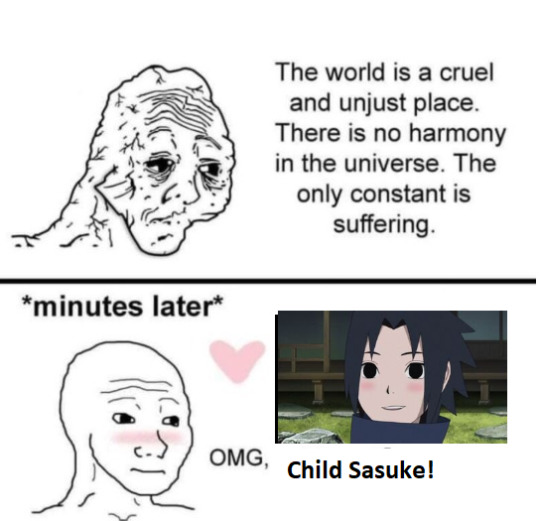
Happy Birthday, King!
Viva La Revolution, one little Sasuke for all times!
77 notes
·
View notes
Text
Going off of this theory post. can anyone who speaks Japanese or knows enough of it tell me if there are specific indicators to know whether when someone says they have siblings, they’re referring to a group of siblings with gender unspecified or if they just have several brothers? When I looked it up, the word for “brothers” and “siblings” (兄弟 kyōdai) is the same.
Also because in some translations (the official VIZ one in particular) Madara never really specifies he had all brothers, just that they used to be five
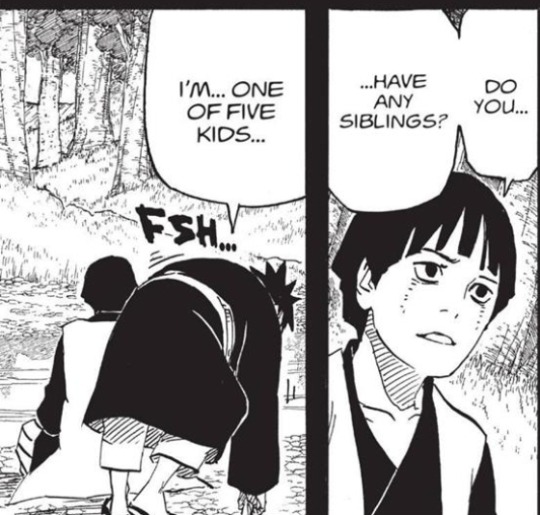
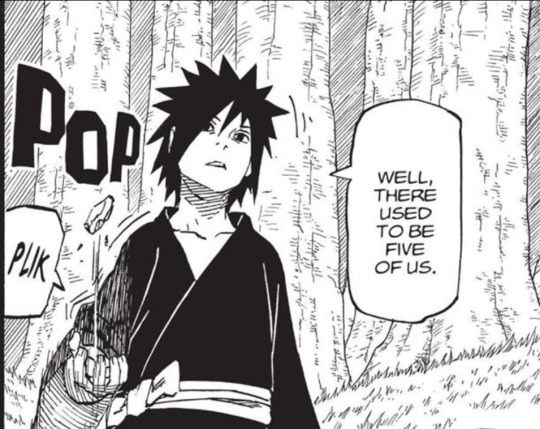

And idk if the subs for the episodes I found on 9anime are official or fan-made or not, but they do the same
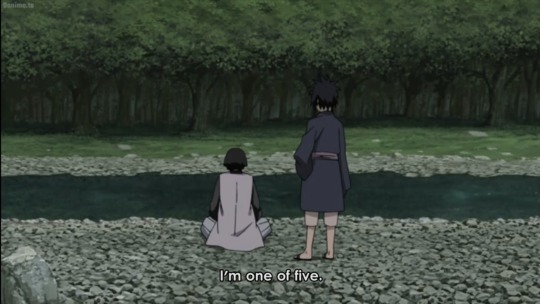
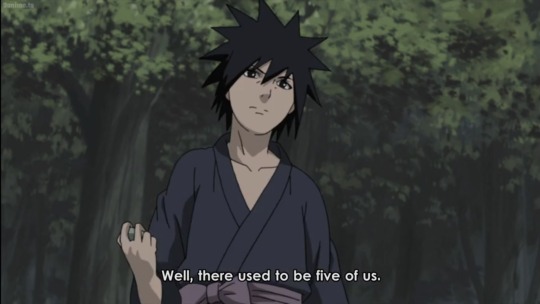

Which means there are different translations going around saying he either outright said he had 4 other brothers, or just says they used to be 5 in the family without specifying everyone’s genders
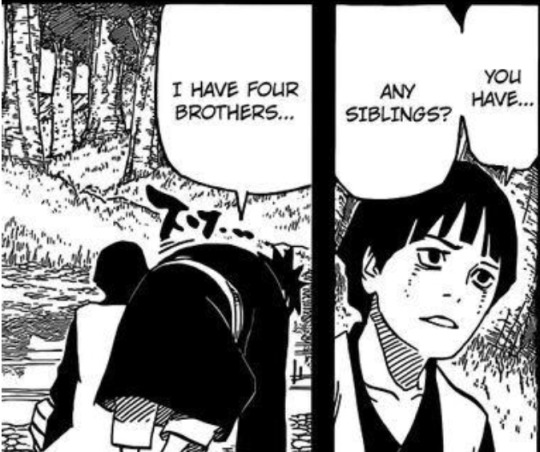
which is why I’m a bit confused. Also the original japanese version does have the actual number 5 written when he says this
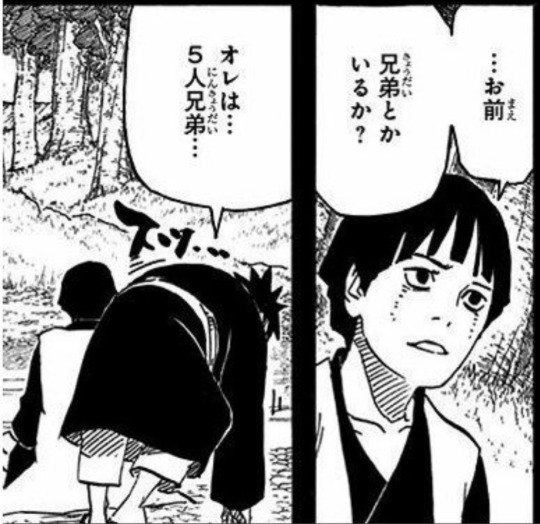
Which gets me thinking the “there are 5 of us” is probably the more accurate one?
ALL this to say that I need a concrete answer for my question so as to not entirely dismiss the possibility that Madara might’ve had sisters.
#language#culture#japanese buddhist folk belief#madara#hashirama#japanese language#japanese culture#buddhism#chinese language#naruto meta#butsuma#butsuma senju
430 notes
·
View notes
Text
Note - short summerization: The antagonism between Persians and Greeks was real. Herodotus just happened to have been the first historian and geographer who is known to have it written down as “East” and “West” in opposition. He wasn’t an imperialist or had colonial ideas as far as I know. Thorsten Pattberg never implied this either in his book. He was only mentioned once there. I regret mentioning him here - at least this evening - because this post could do well without him being mentioned.
I'm not sure whether this is truly an objection. Herodotus is described as “the first recorded historian who deliberately portrayed the ‘east’ (Persians) and the ‘west’ (Greeks) as mutual antagonists”. The quote even continues:
Others, Thucydides (460 BC–400 BC), and Xenephone (430 BC–354 BC), similarly, found it natural to employ strong polarities and concentrate on the ‘otherness’ of the East, while accepting the necessity of resistance to external force by defining a Western ‘self’. Thus came into being the first system of the so-called East-West dichotomy.
It’s written here that the antagonism was a reality of his era. This part is just about the beginning of the “splitting between East and West” in recorded history. It’s not about him being a “caricatural theoretician of the dichotomy East-West” and the modern notion of the “West” couldn’t have meant anything to him. I’ll admit that I don’t know much of him, but I’m fairly sure that he was first and foremost a historian (and geographer) and not a visionary or futurist or aide for conquerors or whatever. This short quote only mentioned him regarding recording history and specifically recording the history of antagonism along the geographical “East” and “West”. Sure, I wrote before the quote about “imperialist narrative of Western Orientalists” and “the origin of the concept” and immediately after the quote about the caricatural East-West dichotomy, and right after about the modern notion of the “West”, and modern colonial ideology, but I didn’t imply that Herodotus was a theoretician or that he was in favor of colonial ideology. However, I realize after reading this part of the post again that this implication could be assumed because of what I wrote before and after the quote you wrote.
What I wrote before:
Unsurprisingly, the concept is criticized for example because of the difficulties in defining regions, generalizations, overlooking regional hybridity and resulting in “elite narratives” of those with power being more easily believed as the supposed representatives of many; in particular, the imperialist narrative of Western Orientalists.
As written by Edward Said in “Orientalism” (1978):
There is nothing mysterious or natural about authority. It is formed, irradiated, disseminated; it is instrumental, it is persuasive; it has status, it establishes canons of taste and value; it is virtually indistinguishable from certain ideas it dignifies as true, and from traditions, perceptions, and judgments it forms, transmits, reproduces.
---
This brings us to the origin of the concept - here from “The East-West dichotomy” by Thorsten Pattberg (2009):
“the origin of the concept” is only meant as the origin of the “East” and “West” being recorded in opposition. At this point it’s nothing more than that. Quote from Thorsten Pattberg:
Thus came into being the first system of the so-called East-West dichotomy.
The “caricatural” (as you called it) East-West dichotomy, that includes colonial ideology and historiography, is build on that “first system of the so-called East-West dichotomy” as basis though. Again, just the opposition and geography. That’s why it’s for me the origin of the concept. It’s nothing deep really. I realize now thanks to you that some could see this as Herodotus creating the concept with ideological implications himself. Especially because I wrote about “the imperialist narrative of Western Orientalists“ right before. My intention was that the text up to --- should be seen as introduction into the topic.
“This brings us to” was surely the wrong way to continue. I could have left the entire part from “Unsurprisingly, ...” to “... reproduces“ for later, but I wanted to have the “... criticized for example because of the difficulties in defining regions, generalizations, overlooking regional hybridity and resulting in “elite narratives” of those with power being more easily believed as the supposed representatives of many ...”right after the list of “marginal area“, “alleged area of Western influence“ because this list shows exactly that.
I can go back and forth, but the point is, I’m just not a precise writer and that Herodotus could be seen as “some caricatural theoretician of the dichotomy East-West” and “as the forefather of the modern colonial ideology and historiography” didn’t even cross my mind. (See my old tag # I can't write these kind of posts...)
I made a quick step from the oppositional basis in history to the caricatural East-West dichotomy (and linked to that the colonial ideology).
See my quote for the step:
This opposition is part of the concept’s naming itself because: “A dichotomy is any splitting of a whole into exactly two non-overlapping parts. Nothing can belong simultaneously to both parts.” [Wikipedia (2008)]
Again, "This opposition” refers just to the opposition between ‘east’ (Persians, Confucian China, Aryans and Dravidians) and the ‘west’ (Greeks, others). Nothing more.
I wrote “is part of the concept’s naming” instead of “is the basis of the concepts naming” in order to avoid the implication you assumed. It clearly didn’t work as I intended.
I wrote “is part of the concept’s naming” to show why the historical recording with “geographical sense” matters in regard to the East-West dichotomy. Seeing someone unkown as opponent or even enemy - regardless whether that’s true or not - can be helpful in the perception that the unknown opponent is nothing like you when you don’t want the “other side” to be anything like you at all. I’m sure that there’s also more to it how other people perceived and/or used for their own purposes the real antagonism that just happened to be between “East” and “West”, which was just about some people wanting to conquer other land for their own reasons, and so on. However, this post and the book from Pattberg aren’t about specifically how colonial thought came to be and who bears some responsibility for that. It’s about the East-West perception and it’s long enough as it is. Herodotus just happened to have been the first historian and geographer who is known to have it written down as “East” and “West” in opposition. That’s all.
East-West dichotomy
In sociology, the East–West dichotomy is the perceived difference between the Eastern and the Western worlds. The division is more in regard to culture or social structures rather than geographical. Therefore, the boundaries of East and West depend on where the focus lies (in consideration to criteria, purpose, time).
[What follows below the cut are pieces of information from a few sources.]
Keep reading
#herodotus#clarification#another misunderstanding#east-west#east-west dichotomy#I'm tired man#and I have to say that I didn't read anything from Herodotus or about him besides this paragraph in Pattberg's book and his wiki entry#my studies have in fact nothing to with ancient history#good night#I feel like I waste my and other peoples time agian#and I can't spell right anymore#time to go to bed
359 notes
·
View notes
Text
Polite note: I’m glad that you like the take on the story. Also, I don’t want you to think that this is an attack or something. This is me being confused and frustrated. The text might be messy.
There’s plenty subjective in art. We can only strive towards objectivity the less straight-forward something is, but not attain it as long as we’re our own person limited by our “experience and knowledge”, “mental characteristics or states“. That is if we even want to be objective.
a definition of subjectivity: relating to or being experience or knowledge as conditioned by personal mental characteristics or states
I specifically wrote more than once that people can ship what they want. However, if they ignore the context, which is extremely heavy in Naruto, then they don’t take the entire art into account. You can of course only look at parts of something and not everything. I probably don’t even perceive everything Kishimoto put into Naruto myself because I don’t know that much about his culture.
My problem was the insistent accusation of homophobia (with capital ARE), writing that people like me would see Sakura and Hinata as feminist role models - which I see as another insult, implying we’re maybe just not smart, and implying that we don’t have “a tiny bit of open mindedness“ while demonstrating that in this case themselves.
Was I harsh in my reaction? Yes. However, I wrote repeatedly how people can ship what they want. My “get the fuck out with your insulting prejudiced assumptions” was an admittedly aggressive defense towards this persons lack of respect for all who don’t ship them and call them (spiritual) brothers. The “insulting prejudiced assumptions“ not meaning the ship itself, but this persons open attitude towards us, and I meant that these “insulting prejudiced assumptions“ should get the fuck out. What the person does with this - whether to keep thinking that people like me are homophob etc. or to be more open-minded (which then means that my “...” doesn’t mean them anymore) - is up to them (if they even read it).
I don’t doubt that some or even many people harass SNS shippers on their plattforms in such a way as this person described (and most likely also experienced) and I don’t doubt that this person felt the need to respond with an aggressive defense towards these peoples lack of respect.
We all generalize (here even more so) and we all make mistakes.
That post just went too far for me. Queer liberation, intersectional feminism and open-mindedness mean a lot to me. I still have a lot to work on - as we all or at least most of us do, but I had time and wouldn’t let this stand just there without clarification with these far-reaching insults. That’s also because I know that there are many who have at least the first and last assumptions. And that post was a peak demonstration of it.
So I think the salt was just fine - needed even to show hypocrisy
(talking about “decoding” while not considering Kishimoto’s culture and background and the culture in canon *²
- “homophobia” while not considering other non-romantic and/or non-sexual identities: "When you trivialise, erase and appropriate homosexual content to suit your heteronormative obsession, you ARE being homophobic.” I could re-write this to: “When you trivialise, erase and appropriate ace and aro content to suit your homosexual obsession, you ARE being ace- and arophobic.“ But I don’t think this way. People can ship SNS or even SS for all I care as long as they don’t have a problem with me criticizing these ships as non-canon and etc.. *³
- “open-mindedness” while declaring that “Because people who think Sasuke and Naruto are brothers are the same people who think Sakura and Hinata are feminist role models.”)
, but we can disagree. I'm fine with being seen as too salty for some.
*² *³ It’s true that nobody can truly know Kishimoto’s intent unless he outright says something, but you can see all the symbols and words and changed myths of his culture in the story. You can read his interviews, read his personal notes in the manga, find out more about him - such as a bit about his relationship with his brother. Or you don’t. He left it open what kind of interpretations we readers make. That’s alright.
My view is that SNS isn’t stomachable for me from their meeting by the destroyed bridge on (which gets romanticized for some reason). I consider it in canon a toxic relationship regardless whether its romance or not. People can ship toxic relationships. I have my own toxic ships. But I think - I’m as sure as I can be - that Kishimoto didn’t intend to make it such a toxic relationship at the end and that he didn’t intend some other things either (just look at Itachi...). However, the Uchiha clan didn’t get any justice. Naruto knows about the massacre and keeps it secret. And so on... My point is that Kishimoto’s intent isn’t the deciding factor here. What ended up on paper is. I can respect some SNS ships and even a few SS ships who claim to see it in canon plus their plausible theories on what happened off-panel (that respect the boundaries of the on-panel characterization and world-building with Itachi being an uncertain factor because his characterization is a mess) because they are reasonably explained from my point of view. I may criticize that with different degrees of respect depending on what they wrote. I won’t respect SNS or SS ships that don’t claim canon evidence for themselves because there’s nothing to respect - just not to disrespect. Respect means something for me. For example: You don’t get respect for daydreaming. You don’t need respect for it. You just want to daydream without being interrupted by disrespect./ At any rate, my problem with that post wasn’t SNS nor the part of not seeing them as brothers - but the insulting assumptions that even impacted me. So yeah, I took it personal because this person made it personal.
Back to >what’s on paper matters<. I wrote “You can ship what you want. SNS sure makes more sense than SS. But it isn’t a canon fact - only their bond is. Platonic bonds matter. Not everything is about romance.” This means that SNS can be seen as ship, but it doesn’t have to be unlike for example Dai and Tsunade who are a canon ship. They have those moments very clear on paper. There’s nothing subjective about that.
“Kishimoto didn’t show any interest in ordinary romantic relationships - regardless whether they’re straight or gay - in this manga. He clearly wanted Sasuke’s and Naruto’s bond to be viewed with consideration to spirituality and mythology.“ I stand by this. He showed it. It’s on paper. You can imagine something else on top of what’s on paper as long as you realize that it’s not necessarily canon (I do too.), but what’s on paper is there. I’ll look at the entirety even if I don’t like it. Other people don’t have to, but when they claim that it’s canon/on paper or are insulting like that, then I might write my piece on it. Could I be wrong about it? Of course it’s possible. Then someone can write their piece on it. I’m always happy to read something that furthers my understanding (when it’s fictional. Negative RL new understanding doesn’t necessarily make me happy. For example learning about media propaganda didn’t.) However, when someone projects their own culture on the story for interpretation while also ignoring the “background” of the story itself - even his culture, and then acts as if this can’t be disputed or else you’re ***(insert personal insult), then no. In this case “art is subjective” isn’t enough to stop criticism that may be not respectful enough for some people. Sasuke and Naruto are spiritual brothers. That’s a fact on paper. It was shown. Even in literal words. There’s nothing subjective about it because this is a story full of chakra, reincarnation, Indra, monk/sage, Kyūbi, etc.. The first page of the story in chapter 1 is like a short folktale. It doesn’t even have to be the authors culture that has to be considered here. It’s literally on paper, and just happens to be his culture. It doesn’t make it any less true just because we don’t know the culture.
I’m sorry, but this insistance, when I answered a rude post where you are accused of homophobia when you don’t agree, in Naruto of all fictional stories on “art is subjective” when it’s about the two main characters relationship is strange for me. This is the only fictional story that I know where I consider the authors culture (because it’s on paper so much) to be very important for interpretation. Interpretation, not wishful thinking or whatever. The post that I attacked or whatever included “decoding” and so on. So, yes. It matters to me. Context matters to me in this way. Goddamn it. Naruto uses the word brother [correction: siblings] even in the last chapters, and so on.
You can ignore it if you want to. Everyone knows that they’re not physically brothers. Everyone knows that they weren’t raised together either. It’s not like spiritual brotherhood and SNS can’t be combined if you really want to ship SNS while not ignoring canon. Izanami and Izanagi are siblings and were a couple once upon a time in myth. I admit that I don’t know whether spiritual brotherhood and romantic love at the same time are possible in the theory of the culture. Why would SNS shippers care about that though? If “art is subjective”, then you can at the very least see it as one of those exceptions.
I saw a post where anyone who says that Sasuke and Naruto don’t have a romantic relationship gets accused of being homophobic and heteronormative.
Granted, the tags and content imply it was about Naruhina and Sasusaku shippers and people who are pro ending because of the “het ending”, but that person seriously accused this:
Well, at least you are being consistent. Because people who think Sasuke and Naruto are brothers are the same people who think Sakura and Hinata are feminist role models.
No. Sure there are those who think so, but don’t put everyone in that group just because it’s easier for you.
Sakura and Hinata aren’t feminist role models. Just reading that makes me grimace. I also ship neither Sasusaku nor Naruhina.
Sasuke and Naruto are spiritual brothers. They have their chakra respectively from the biological brothers Indra and Ashura.
Keep reading
#you know I used to see SNS as possible before the bridge confrontation - I used to be understanding for SNS until the end and beyond#but then I read a lot of things from some SNS fans - and I'm not a person who is respectful to some stranger on the internet who was so#disrespectful towards me#tumblr frustrates me because of this#I already feel like taking a break from here again#I want to be here peacefully - but I find things triggering#does respect even mean anything anymore?#why should I respect someone who belittles me unfounded in such a hypocritcal way?#is that person a delicate flower that happens to throw thorns at people passing by?#I'm expected to ignore it? To be nicer? To be a doormat?#I don't get it honestly#why am I wasting my time with this?#I hope the people reading this don't think that their time was wasted#why do I care about this anyway?#no - I know - it's because the post was so insulting and the tags make it look to me that we're mutually attacking each other equally#people can give their opinion if they want to#am I taking things out of proportion?#this wouldn't matter if it weren't for the insults on the post#yes - I'm salty again - a lot
138 notes
·
View notes
Text
Lol “Wiener” That’s a good one.
Speculation: Maybe hostile is regarded as evil by the “Will of Fire” ninja? The “Will of Fire” is for them the basis of their morals (whether you agree those are morals or not). All those who stand against the “Will of Fire” could then consequently be called evil. It would fit for Naruto and Shikaku who are believers.
Interesting insight about Tobirama’s legacy. However, I think Hiruzen was more than willing to sacrifice others for the village. (For example Chunin exam continuation despite warning from Anko.) He just didn’t want to do the deeds himself with his own hands. I would say that he was a coward.
Still, it fits that Tobirama is his own counterweight, and that Hiruzen and Danzo each followed only either the yang or yin part of Tobirama their own way.

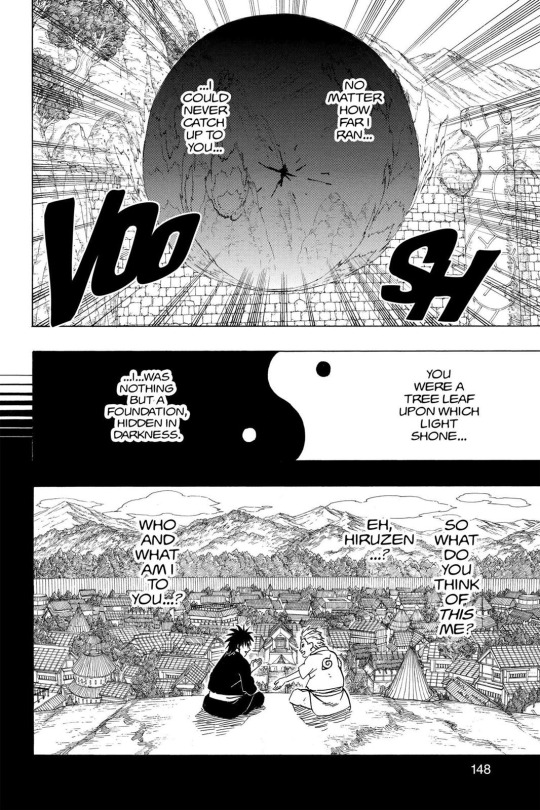
I just think the public figure “Hokage” “upon whom the light shines”, who has the official leading part, is the yang part. The one doing the “work in the darkness”, the not official work which needs to be done as foundation for Konoha to work, is the yin part. Tobirama handled both.
How do you see Tobirama being Izuna’s killer as symbolic? Because Tobirama doesn’t need a counterweight?
About where dork maybe came from:
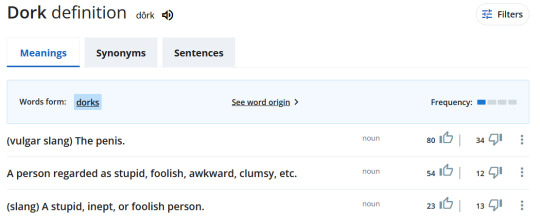
Apparently one of the meanings of “dork” is the vulgar slang “The penis”.
I didn’t know this either. Maybe because English isn’t our first language? What do people with English as their mother tongue think about this?
Boruto Graffiti Mistranslation!
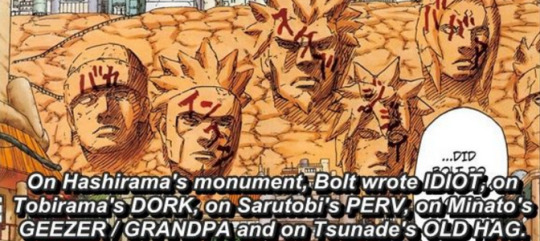

1st -> バカbaka/Idiot: Tobira to Naruto: “Your a bigger バカidiot than elder brother!”
2nd -> インケンinken/.. DORK??? wwwWIENER? They must’ve confused インケン with インケイinkei/peeenis!!!! 🤣 inkei isn’t an insult…
3rd -> スケベ sukebe/perv, Jiraya, grand pervert himself, said スケベ to describe Hiruzen’s lewdness in flashback.
4th -> ジジイjijii/geezer, jiji can be geezer(insulting, calling them old) or grandpa depending on how you say it/context. same with baba grandma/hag. Minato is Boruto’s biological grandpa.
5th -> ババアbabaa/hag, naruto called her バアちゃんbaachan/granny. And she is quite old.
6th -> lips
7th -> アホaho/idiot, interchangeable with baka, fitting since reincarnations.クソオヤジkusooyaji/shitDad, boruto’s father…
the written insults seem to match
how translate インケン?

he shows up in images…

陰険: the surface appears good, but harbors evil intentions in their inner heart.
Keep reading
#language#mistranslation#anti tobirama#anti will of fire#naruto meta#boruto meta#I think I wanted to write more on it - but I don't remember... Sorry...#yin and yang#translation#tobirama
302 notes
·
View notes
Text
I’m on hiatus from now on and I have no idea for how long.
I wanted to post @komehyappyou‘s great funny post (see here) with an addition before circumstances changed. It’ll be the first post I make when I come back from my hiatus.
All the best to you!
10 notes
·
View notes
Text

Itachi is the one character in the Naruto manga that doesn’t make any sense even when you consider that he’s the liar.
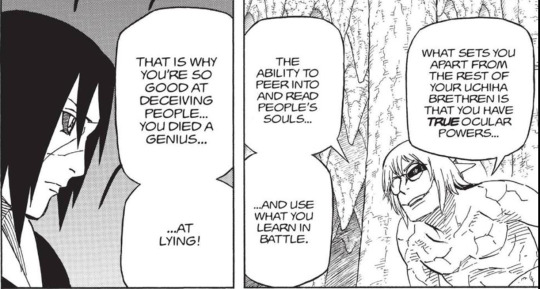
We never see his thoughts. His words are unreliable and his actions don’t make sense when you look at the entire context.
My speculation is that:
1) Kishimoto wrote himself into a corner.
Interview (1) excerpt:
Shonen Jump: Oda-sensei says he knows how One Piece will end---do you know how Naruto will end?
Masashi Kishimoto: Yes, I have the last episode clearly drawn in my mind. I've already decided on the layout, text, and scenes. Not just the story ideas, but the visual ideas are solid.
All I have to do is just head toward the ending I have, but there are still so many things that need to be resolved before reaching that point. Maybe I have thrown in too many ideas, so I need to wrap them up neatly.
I made a post about the ending and how he abandoned Sasuke’s character because he didn’t manage to “wrap it up neatly”. At first I thought that the way Itachi is later written was probably to get Sasuke back to Naruto and let Konoha off the hook, and to get Naruto off the hook about not revealing Konoha’s genocide of the Uchiha clan. The integrity of the main characters was of course more important than a character like Itachi and he wanted these panels at the end:
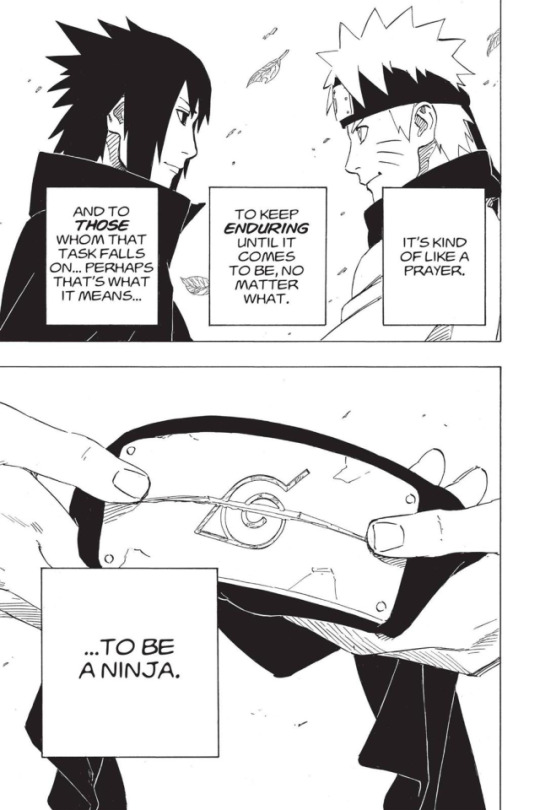
How did it get to this point though?
Summary of an interview (2) excerpt:
Q3: “Did you have to think hard about [the setting/ creation of] naruto’s classmates?”
A: Kishimoto didn’t actually originally intend for that kind of setting. Originally he intended to focus on various missions that Naruto went on, meeting 4-man cells from other villages. The teachers of the 4-man cell would be Kakashis rival. But after discussing this with his editor, he was told there wouldn’t be time for such a slow-paced development, so he needed to come bring all these characters and villages out at once. You’re going to make a tournament. Kishimoto said he can’t do it and if he did it’d kill him [not literally], but he was told to do it even if it kills him. That is how the Chuunin exams arc came about. That was what he was forced to do. But even now he wish he could do his original idea about focusing on missions.
This was certainly not the only time that he was told to do something that he didn’t want to do and of course he complied with his (changing) editor in the end because that’s generally wanting to keep your job in a capitalistic society and more specifically it’s Japanese business culture (a bit about it compared to American workplaces):
In Japanese companies, employees must get their superiors' approval whenever they make a decision
Many Japanese companies adhere to a mantra called ho-ren-so, according to a paper from Doshisha University in Kyoto, Japan. Ho-ren-so is a mnemonic device that combines the first syllables of three verbs: Houkoku (report), renraku (contact), soudan (consult).
This means that an employee in Japan must always keep their superiors informed about what they are doing. Every decision, no matter how small it may seem, should go through the chain of command and get the stamp of approval from the boss. Employees should immediately report any problems to their bosses before trying to take care of anything on their own.
(more or less the same expressed in different ways and with different details: workinjapan.today; japanintercultural.com; en.tokhimo)
Another reason would be that Kishimoto didn’t think it through from the beginning:
Summary of an interview (2) excerpt:
Kobayashi points out that there were many things introduced in this arc that played huge roles right until the end of the series (kekkei genkai, sharingan etc), but Kishimoto just said he was ‘bluffing’ with these things in the beginning [nb: in other words he just made them up without any thought on how to use them in the future]. At the time he was just making these things up for the excitement and suspense, but didn’t pick up on what to do with some of these threads long-term until later. Basically he was making it up as he went. Even with Sasuke’s backstory, at the time of the Wave Arc, all that had been thought out was that Sasuke had an elder brother who had done something bad, and that was it. Kishimoto admits the planning was very hazy at this point. However, at the point where Itachi is actually introduced, Kishimoto had decided to secretly make him a good guy, but the reason he did something bad was because of circumstances. Kishimoto also says that although he introduced the Sharingan as being able to copy moves, the premise on what the Sharingan could do changed drastically over the course of the storyline.
If this summary of an interview is credible, then Kishimoto at least officially excuses Itachi’s actions, which is something that would go along with whitewashing criminals. This practice is generally widespread by what I mean that one shouldn’t see it just in relation to Japan even though he’s Japanese. *cough* USA *cough* Hollywood movies *cough*
Interview (3) excerpt:
Shonen Jump Question: In closing, what advise would you give fans who are interested in becoming artists themselves?
Masashi Kishimoto: Creating manga isn't just about drawing well, but writing a good story. Keep the art and the story real, and you can't lose. Also, watch a lot of good Hollywood movies. Those who rail against the entertainment industry are just being close-minded.
I think that Kishimoto does have leanings to make excuses about war crimes or at least uses these widespread excuses and the widespread framing that you encounter so easily in mainstream media. See my post on Kishimoto’s framing as example for that.
All in all, I think you’re definitely right regarding your first possibility that he screwed up. However, regarding your second possibility about whitewashing characters: Itachi was still framed as having done something wrong. He admits so himself. However, it’s still “hush, keep it secret” because “honor in a nationalist framing”, and “revolution no good” - “the slowest of reforms without acknowledgment instead”. Still, Sasuke did get a lot of attention as a representative of wronged people and someone who tries to do something about injustice and generally the ills of society. So I think it’s also kind of your second possibility. I just think that it’s not his personal position, but he grew up in a culture that elevates the collective above the individual and you can write about things that you’re conflicted about (or you can write about things that don’t even have anything to do with you of course).
Interview (4) excerpt:
SJ: There are a lot of fans out there who read your manga in English. Do you have a message for them?
Kishimoto Sensei: It’s a very Japanese manga, so I thought it might be difficult for people from other countries to understand in English, but I’m very happy that you’re reading it. Naruto has already reached its conclusion, but please continue to support my work.
Interview (3) excerpt:
Shonen Jump: You grew up next to a military base, and the ninja in Naruto behave something like a military force, with discipline and training. Are you a military enthusiast, and did you ever consider joining the Japanese Self-Defense Force (JSDF)?
Masashi Kishimoto: I don't really consider myself a military enthusiast. Where I grew up didn't really have a military base, as Japan doesn't have a military, just a Self-Defense Force. What I did was use the training grounds of the SDF as a reference, in addition to books on the Mossad and the SAS. I never wanted to join the JSDF, as I wanted to draw manga.
#anti itachi#anti kishimoto#kishimoto#because he tried to do justice to Sasuke's character trying out all the ways he was capable of and allowed to do
192 notes
·
View notes
Text
Simplified for those who don’t know
Narrative-critical understanding is about using your critical thinking to understand narratives.
A narrative is the way a story is told and what is told. Some probably think of narratives as entertainment, but narratives have many purposes beyond entertainment and escape. Throughout human history, people from cultures across the world have created and adopted or nowadays even consumed narratives.
The reason is that narratives are the primary way that we understand and give meaning to our lives. Narratives show a point of view - a perspective about the given topic or subject of the story or part of the story. They can be unreliable or just simply different.
Critical thinking isn’t about finding faults and complaining. You can just as well call it reasonable reflective thinking.
In regard to stories it’s for example about analysing the perspective in order to understand its parts, its interconnections in the story, its connections to other stories and narratives, general comparison with other narratives and its place in the bigger picture. The framing and the context should be examined. The socio-political context should be researched.
Defining critical thinking according to The Foundation For Critical Thinking.
Make up your own mind.
195 notes
·
View notes
Text
The Uchiha Clan’s “Prestige“
The argument on “prestige” is a poor one. It isn’t well-thought-out, and as I keep stating: it’s there to shift the blame from Itachi to the clan; hence, in that regard, it’s far from clever (trust me, when I tell you that you aren’t being novel, you sincerely aren’t).
Keep reading
#pro uchiha#anti itachi#anti will of fire#u.s. critical#uchiha clan#anti itachi fandom#anti konoha#criticism#uchiha massacre
132 notes
·
View notes
Text
My anti tags don’t mean that I hate the fictional character. (That’s too much of a bother anyway. Why would you waste your energy on negative emotions towards fictional characters?) It means either that I disapprove of the kind of behavior they showed (maybe even just in this instance) or it ensures that fans of that character may filter the post through the tag because they may not want to read the post.
For example, shinobiguts (unfortunately deleted) was a fan of Sakura and I loved reading the different perspective of her that they posted.
19 notes
·
View notes